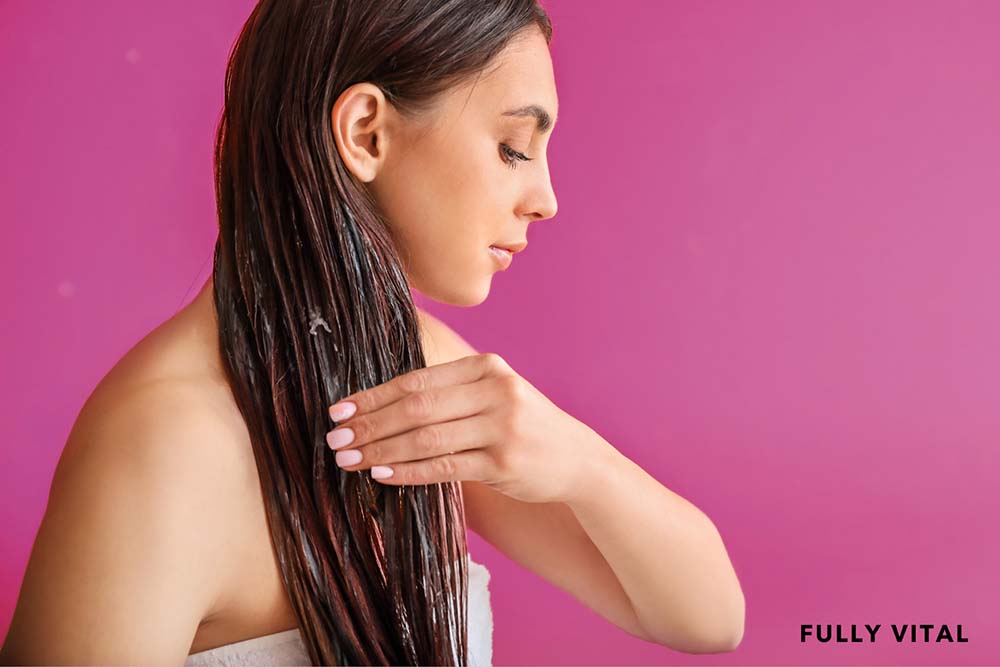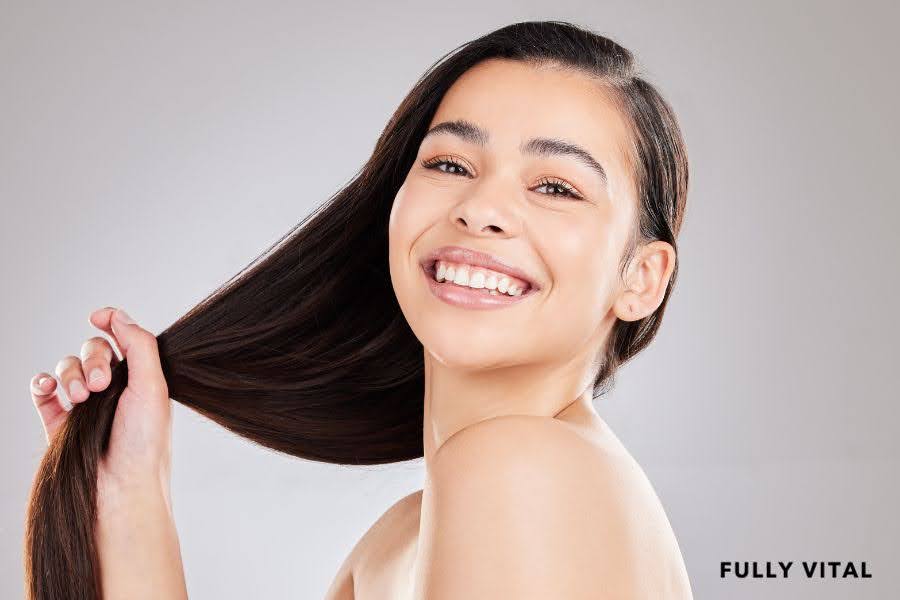
Surfactants: Unveiling the Secrets In Hair Care Products
Are you on a quest to unlock the secret to luscious locks and stimulate hair growth?
If so, you've probably come across the term "surfactants" during your research.
In this article, we'll delve into the world of surfactants and their importance in hair growth products. So, grab a seat and let's dive in!

I LOVE MY HAIR NOW
FullyVital hair serum and hair vitamins made tremendous improvements in my hair. I truly love my hair now.
Meg S.,
What are Surfactants?
Surfactants, short for surface-active agents, are key ingredients found in a wide range of hair care products.
These compounds possess unique properties that enable them to interact with both water and oil.
Surfactants work by reducing the surface tension of liquids, allowing them to spread more easily.
In the context of hair growth products, surfactants play a crucial role in the formulation and effectiveness of these products.

Why are Surfactants Important?
Surfactants are vital components in hair growth products for several reasons.
Firstly, they help to remove dirt, excess oils, and product buildup from the scalp and hair strands.
This cleansing action creates a clean and receptive environment for other active ingredients to penetrate the hair follicles and promote healthy growth.
Secondly, surfactants contribute to the foaming and lathering properties of shampoos and cleansers.
While this may seem like a purely aesthetic feature, it actually helps distribute the product evenly and efficiently throughout the hair, ensuring maximum effectiveness.
What are the Benefits of Surfactants?
Surfactants offer numerous benefits when incorporated into hair growth products:
Thorough Cleansing
Surfactants effectively remove impurities, dirt, and excess oils from the scalp and hair, providing a clean foundation for optimal hair growth.
Enhanced Penetration
By reducing surface tension, surfactants enable other beneficial ingredients to penetrate the hair shaft and follicles more effectively, nourishing and revitalizing the hair from within.
Improved Product Distribution
The foaming and lathering action of surfactants ensures even distribution of the product, enhancing its overall effectiveness.
Oil Control
Certain surfactants help regulate sebum production, preventing excessive oiliness that can lead to scalp issues and hinder hair growth.
Are there any Downsides to Surfactants?
While surfactants offer significant benefits, it's important to note that some individuals may experience potential drawbacks:
Dryness
Certain surfactants, especially those with stronger cleansing properties, can strip the hair and scalp of natural oils, leading to dryness.
It's crucial to choose products with gentle surfactants if you have dry or sensitive hair.
Irritation
In rare cases, individuals with sensitive skin may experience irritation or allergic reactions to certain surfactants.
Patch testing and selecting products formulated for sensitive skin can help mitigate this risk.
What are the Alternatives to Surfactants?
For those seeking surfactant-free options, there are alternative cleansing methods available:
Co-Washing
Co-washing, short for conditioner washing, involves using a gentle, moisturizing conditioner to cleanse the hair without the use of traditional surfactant-based shampoos.
This method helps retain natural oils while still removing impurities.
Natural Surfactants
Some natural ingredients, such as soapwort, yucca root, and soap nuts, possess mild surfactant properties and can be used as alternatives to synthetic surfactants.
These natural options offer a gentler cleansing experience.
What is the History of Surfactants in Hair Care Innovation?
Surfactants have a rich history that intertwines with the evolution of hair care products.
From ancient civilizations to modern scientific advancements, the use of surfactants has played a pivotal role in the development of effective hair growth products.
Understanding the historical context helps us appreciate the progress made and the foundation upon which the current industry stands.
Throughout history, various cultures utilized natural ingredients with surfactant properties, such as plant extracts and soaps derived from fats or oils.
These early surfactants were often used for cleansing purposes and maintaining hair hygiene.
As scientific knowledge expanded, researchers began to develop synthetic surfactants that offered improved cleansing, foaming, and emulsifying abilities.(1)
The introduction of synthetic surfactants in the mid-20th century revolutionized the hair care industry.
These innovative compounds enabled the formulation of shampoos, conditioners, and other hair growth products with enhanced cleansing power and better performance.
The ability of surfactants to remove dirt, excess oils, and product buildup from the scalp and hair became a cornerstone of effective hair care.
What is the Current Environment of Surfactants in Meeting the Needs of Diverse Hair Types?
In today's dynamic hair care landscape, surfactants continue to be a vital component of hair growth products.
With an increasing focus on individual hair types and unique needs, hair care brands strive to develop formulations that cater to diverse audiences.
Surfactants are carefully selected and combined to create tailored products suitable for different hair types, including straight, curly, textured, and chemically treated hair.
Manufacturers prioritize gentler surfactants to maintain the natural moisture balance of the hair while effectively cleansing the scalp and strands.
Additionally, environmentally friendly surfactants that minimize their ecological impact are gaining popularity, aligning with the growing demand for sustainable and eco-conscious products.
The current environment also emphasizes the importance of surfactants in product innovation.
Researchers and hair care experts continuously explore new surfactant technologies to improve product performance, enhance ingredient delivery, and address specific hair care concerns.
The ongoing advancements in surfactant science contribute to the development of more effective and targeted hair growth products.(2)
What is the future of surfactants in unleashing the potential of hair care as the industry evolves?
As the hair care industry evolves, the future of surfactants holds exciting possibilities.
Continued research and innovation will likely bring forth new surfactant formulations and delivery systems that further optimize the effectiveness of hair growth products.(3)
Future surfactants may focus on delivering multifunctional benefits beyond cleansing and foaming.
These innovative compounds might include properties that support scalp health, strengthen hair fibers, and provide additional nourishment to promote hair growth.
Surfactants with enhanced compatibility with natural and organic ingredients may also emerge, catering to the rising demand for clean beauty and sustainable practices.
Moreover, advancements in surfactant science may lead to the development of personalized hair care products.
By understanding individual hair characteristics and needs at a deeper level, surfactants can be tailored to deliver targeted solutions for specific concerns, providing customized experiences and optimal results.(4)
In summary, surfactants play an integral role in the past, present, and future of hair growth products.
They have paved the way for innovative formulations, catered to diverse hair types, and acted as a catalyst for advancements in the industry.
By embracing the history, addressing current demands, and anticipating future possibilities, hair care brands can harness the power of surfactants to create transformative and effective solutions for individuals seeking to stimulate hair growth and achieve their hair care goals.
Are Surfactants Safe for Hair?
Absolutely! When used in the appropriate concentrations and formulations, surfactants are generally safe for hair.
In fact, they are widely used in various hair care products, including shampoos and cleansers, to effectively remove dirt, oils, and product buildup from the scalp and hair strands.
However, it's important to choose products with milder surfactants if you have particularly dry or sensitive hair.
Remember, finding the right balance is key to maintaining healthy and beautiful hair.
Which Surfactant is Best for Shampoo?
The best surfactant for shampoo depends on various factors, including your hair type and personal preferences.
However, one widely recognized and commonly used surfactant in shampoos is sodium lauryl sulfate (SLS).
It provides excellent cleansing and foaming properties, ensuring a thorough and satisfying hair washing experience.
Other popular surfactants for shampoos include sodium laureth sulfate (SLES) and cocamidopropyl betaine (CAPB).
Ultimately, the best choice will vary based on individual needs and desired hair care goals.
What is a Good Example of Surfactant?
An excellent example of a surfactant commonly used in hair care products is cocamidopropyl betaine (CAPB).
CAPB is a mild, biodegradable, and readily available surfactant derived from coconut oil.
It offers gentle cleansing and foaming properties while maintaining the natural balance of the scalp and hair.
CAPB is widely recognized for its compatibility with various hair types, making it a popular choice among consumers and manufacturers alike.
What is a Natural Surfactant?
A natural surfactant is derived from plant or vegetable sources and is considered a more environmentally friendly alternative to synthetic surfactants.
One example of a natural surfactant is soapwort (Saponaria officinalis).
The roots of the soapwort plant contain saponins, which possess mild cleansing properties.
Another natural surfactant is yucca root extract, derived from the yucca plant, which has been traditionally used for its foaming and cleansing abilities.
Soap nuts, also known as soapberries, are another natural option that contain natural surfactants called saponins.
These natural surfactants provide a gentler cleansing experience while minimizing potential harm to the environment.
By opting for natural surfactants, you can enjoy the benefits of effective cleansing while embracing a more eco-conscious approach to hair care.
Unlock the Potential of Youthful Hair with Fully Vital
- Slow Down & Reverse Aging: Experience the power of our science-backed hair growth products that effectively combat the signs of aging in your hair.
- Nurture a Healthy Relationship: Say goodbye to dull, lifeless locks and embrace a vibrant and healthy connection with your hair.
- Transformative Results: Our carefully formulated products are designed to stimulate hair growth, strengthen strands, and restore youthful vitality.
- Scientifically Proven Solutions: Backed by extensive research and innovation, our hair growth products harness the latest advancements in the field to deliver optimal results.
- Diverse Range for Every Need: With our variety of specialized products, we cater to different hair types and concerns, ensuring you find the perfect fit for your unique needs.
- Embrace Your Hair's Potential: Discover the transformative power of Fully Vital and take control of your hair's aging process.
- Your Journey Starts Here: Begin your path to luscious, youthful locks today with Fully Vital's scientifically advanced hair growth products.
Remember, the power to unlock your hair's potential lies in your hands.
Choose Fully Vital and embark on a journey towards a more vibrant and rejuvenated hair experience.
Final Thoughts on Surfactants
Surfactants are a crucial element in the world of hair growth products.
Understanding their role, benefits, and potential downsides allows us to make informed choices for achieving and maintaining healthy hair.
By effectively cleansing the scalp, facilitating ingredient penetration, and ensuring even distribution of hair care products, surfactants contribute to stimulating hair growth and promoting overall hair health.
At Fully Vital, we recognize the significance of surfactants in our range of hair growth products. Our mission is to help you nurture a healthy relationship with your locks, combating the effects of aging on your hair.
With our diverse selection of products designed to address different hair types and concerns, we offer innovative solutions to support your hair growth journey.
Discover the transformative power of our hair growth products and unlock the potential for vibrant and resilient hair.
Embrace the benefits of surfactants and take a step toward revitalizing your hair.
Frequently Asked Questions About Surfactants
Can surfactants cause hair loss?
No, surfactants themselves do not directly cause hair loss. However, using harsh surfactants or over-cleansing the hair and scalp can lead to dryness, breakage, and other issues that may indirectly impact hair health.
Do all hair growth products contain surfactants?
Not all hair growth products contain surfactants, as some formulations may prioritize natural or surfactant-free approaches. However, surfactants are commonly used due to their cleansing and product delivery benefits.
Are surfactants harmful to the environment?
Certain surfactants, particularly those that are non-biodegradable or poorly biodegradable, can have adverse effects on aquatic life and the environment.
However, many hair care brands are now opting for more environmentally friendly surfactants to minimize their ecological impact.
Can surfactants make my hair greasy?
Surfactants, when used appropriately, help regulate sebum production and remove excess oil from the scalp.
However, using harsh surfactants or over-washing can disrupt the natural oil balance and potentially lead to greasier hair over time.
Can surfactants cause scalp irritation?
In rare cases, certain surfactants can cause scalp irritation or allergic reactions in individuals with sensitive skin. This can manifest as redness, itching, or a burning sensation.
If you experience any discomfort or irritation after using a hair care product containing surfactants, discontinue use and consult with a dermatologist.
Patch testing a small amount of the product on your skin before applying it to your scalp can help identify any potential reactions.
Are there surfactants that are suitable for curly or textured hair?
Yes, there are surfactants specifically formulated for curly or textured hair.
These surfactants are often milder and more moisturizing to prevent excessive dryness and maintain the natural oils and moisture of the hair.
Look for products labeled as suitable for curly or textured hair and containing ingredients like coco-betaine, decyl glucoside, or coco-glucoside, which are known for their gentle cleansing properties.
Do surfactants affect the color of dyed or chemically treated hair?
Harsh or sulfated surfactants can potentially strip away hair color more quickly, especially in the case of vibrant or semi-permanent dyes.
To protect your hair color, it's recommended to use color-safe shampoos formulated with gentle surfactants.
These shampoos help minimize color fading and maintain the vibrancy of dyed or chemically treated hair.
Additionally, it's advisable to follow the guidance of your hairstylist or the product instructions for optimal color maintenance.
Can surfactants be used in leave-in hair products?
Leave-in hair products, such as conditioners or styling products, typically contain a different class of ingredients compared to those found in rinse-off products like shampoos.
While surfactants are less commonly used in leave-in products, some formulations may still include mild surfactants to aid in product distribution and penetration.
However, the concentration and type of surfactants used in leave-in products are typically lower and gentler to avoid any potential buildup or adverse effects.
Sources:
-
Draelos, Z. (2010). Essentials of hair care often neglected: Hair cleansing. International Journal of Trichology, 2(1), 24. https://doi.org/10.4103/0974-7753.66909
-
Cornwell, P. A. (2017). A review of shampoo surfactant technology: consumer benefits, raw materials and recent developments. International Journal of Cosmetic Science, 40(1), 16–30. https://doi.org/10.1111/ics.12439
-
Gavazzoni Dias, M. F. (2015). Hair cosmetics: An overview. International Journal of Trichology, 7(1), 2. https://doi.org/10.4103/0974-7753.153450
-
Gavazzoni Dias, M. F. R., de Almeida, A. M., Cecato, P. M. R., Adriano, A. R., & Pichler, J. (2014, July). The shampoo ph can affect the hair: Myth or reality?. International journal of trichology. https://www.ncbi.nlm.nih.gov/pmc/articles/PMC4158629/







